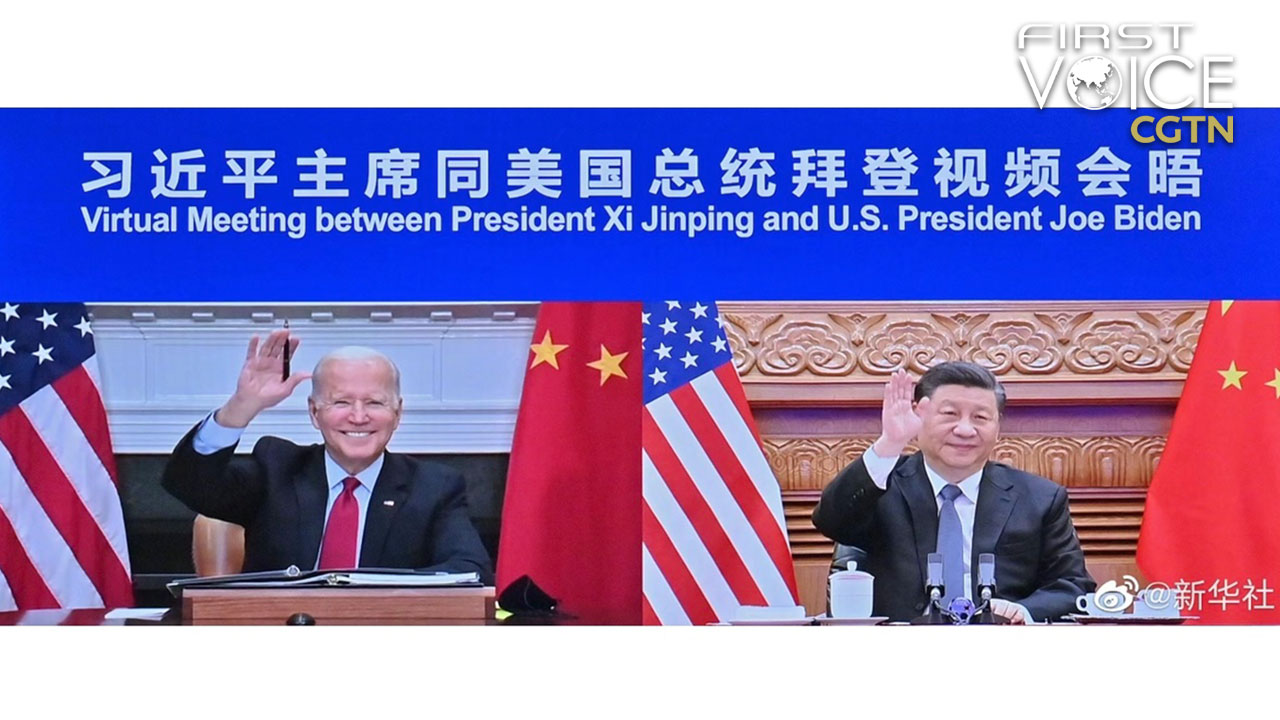
Editor's note: CGTN's First Voice provides instant commentary on breaking stories. The daily column clarifies emerging issues and better defines the news agenda, offering a Chinese perspective on the latest global events.
On November 16, Chinese President Xi Jinping and U.S. President Joe Biden engaged in a virtual meeting, the first since Biden took office. The meeting saw the two leaders discuss strategic and fundamental issues.
During the meeting, Xi told Biden that the two countries "should respect each other, coexist in peace, and pursue win-win cooperation" and that a "sound and steady" relationship is crucial "for advancing the two countries' respective development and for safeguarding a peaceful and stable international environment" not least in addressing "global challenges such as climate change and the COVID-19 pandemic."
It's time to act on that message. The United States needs to manage its relationship with China – the most important and crucial bilateral diplomatic relationship in the world– with maturity, pragmatism and reason, as opposed to being driven by trigger-happy, impulsive, fear-inducing and dangerous posturing that have brought ties to the brink. Instead of trying to change or challenge China, Washington must strive to work with it in pursuit of the best results, recognizing in turn this relationship is not a zero-sum game.
Over the past several years, American foreign policy towards China has been stuck in a rut of selfishness, small-mindedness and reactionary politics floated on nostalgia and an inability to accept change. In other words, the rise of China has created an identity crisis in the U.S., which has led it to become obsessed with a power-hungry dream of sustaining global dominance at all costs, bringing about counterproductive, self-destructive and irrational behavior, hyping up the China threat.

A U.S. Air Force C-17 Globemaster III transport aircraft lands at Taipei Songshan Airport, Taiwan, China, June 6, 2021. /Getty
A U.S. Air Force C-17 Globemaster III transport aircraft lands at Taipei Songshan Airport, Taiwan, China, June 6, 2021. /Getty
Although this was cemented in place by Donald Trump, it was nonetheless embraced by mainstream U.S. politicians as a "new consensus," which derides engagement with China as a form of weakness, and prioritizes hostile action and confrontation. U.S. policy has been aimed at undermining China's national sovereignty, attempting to advance military containment of China, and pursuing discriminatory moves against Chinese companies on false pretenses. The list goes on. The U.S. would even rather let itself sit on surging inflation than contemplate the idea of lifting Trump's self-defeating tariffs on Chinese imports.
This isn't a constructive relationship, and it isn't one in good faith either. If the U.S. wants a cooperative, beneficial and stable relationship with China, it must find a stable way to address these differences like an adult, and must cease provocative, destabilizing and reckless behavior which puts the two countries on a collision course.
For example, while the virtual meeting may produce positive dialogue, will the U.S. ultimately cease to play the Taiwan card as normal? Or stop provoking regional security with moves like AUKUS? Are these the "guardrails" that Biden spoke of? Is that stability or assurance?
President Xi was clear during the meeting. "We are patient and willing to do our utmost to strive for the prospect of peaceful reunification with the utmost sincerity," he said. But if "Taiwan independence" forces make provocations or cross the red line, the Chinese mainland "will have to take decisive measures." If it wants good faith, the Biden administration needs to live up to its words and it is not possible that a globally beneficial relationship is secured until these changes are made.
The message to the U.S. is that the China-U.S. relationship needs the two countries to work together to move forward in a more positive direction. As President Xi said, China and the U.S. "should go forward together against the wind and must not yaw, stall or collide." Tuesday's virtual meeting was a constructive and productive event, but it will mean nothing if the U.S. continues to infringe on China's interests, depict ties as a global ideological struggle and feign hostility for political point-scoring back home.
(If you want to contribute and have specific expertise, please contact us at opinions@cgtn.com.)

